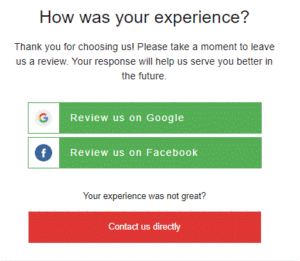The short answer for this one is yes. People will always perceive your business online through two avenues: your message and the aesthetic of that message. Whether they familiarize themselves with your business through online ads with compelling imagery and powerful messaging, or your website with well-crafted content and a solid, modern design, the way you market yourself carries a significant impact in your potential customers’ perception of your value.
Since many business owners spend a generous amount of time developing great websites and putting together top creatives for ad campaigns, it makes sense to curate the other side of their online representation – their reputation – appropriately. Customer reviews garnered through Google. Yelp, Facebook, and other industry-specific websites reflect a company’s online reputation better than any other sources.
How People Perceive Online Reviews
We recently polled 250 people on a survey website and asked the following questions:
- On a scale of 1-10, how important are reviews to you when selecting the services of a local business?
- For review websites where the rating is 0.0-5.0 including fractions, what is the minimum rating someone should have to be a viable choice?
- What is the number of reviews a business should have to appear legitimate?
The results intrigued us. We anticipated the answers would be:
- 8.00 on a scale of 1-10 for importance
- 4.20 as a minimum for reviews
- 15.00 for the number of reviews that would be required
These were the actual results:
The average, which could suffer from outlier responses (Ex: saying 1 for importance and 150 for numbers of reviews), was:
- 6.66 on a scale of 1-10 for importance
- 3.75 as a minimum for reviews
- 26.39 for the number of reviews that would be required
The median, which was the response that was in the middle of all results if put in descending order of quantity, was:
- 8.00 on a scale of 1-10 for importance
- 4.00 as a minimum for reviews
- 10.00 for the number of reviews that would be required
The mode, or the most common response for each category, was:
- 7.00 on a scale of 1-10 for importance
- 3.80 as a minimum for reviews
- 10.00 for the number of reviews that would be required
We took the previous results and further averaged them based off
weight: 50% median, 25% mode, 25% average. We obtained the following results which we can use as a solid basis:
- 7.415 on a scale of 1-10 for importance
- 3.8875 as a minimum for reviews
- 14.10 for the number of reviews that would be required
At the very least, most small businesses should work toward a 3.9-star rating and 14 reviews. Keep in mind that none of this matters if your competition has better numbers than you do. If this is your situation, you will likely want to strive to obtain even more reviews with better ratings to get ahead.
If reviews are so critical, how can businesses more easily gather them? One method is to partner with a vendor that has systems in place to automate the entire process. To do this, all you would have to do is provide the vendor a list of emails. Here is how it works.
Boost Your Email Game with Automation
At Market My Market, we use this exact same process to generate reviews on behalf of clients, and it’s something you can go and implement right now. We only suggest a few pre-requisites so that you can follow the same steps we take:
- Prepare a template with some simple graphics to make it appealing
- Make the email appear more like a third-party inquiry about the client’s overall experience of working with your business instead of a direct solicitation
- Keep track of emails that don’t get opened or set up your own automation for such emails.
- Maintain a timeline for sending out follow-up emails
The Template

Something along these lines would work well as a template, particularly for reviews making their way to Google and Yelp. Google and Yelp are against “pre-check sentiment,” which essentially means you would deter a reviewer from leaving a review if you did a pre-check via email to see if they would rate the experience 1-10 in advance.
The Email Campaign
Setting up some a subdomain to email would likely be a good choice. The point is to avoid the notion of a solicitation and make it more like a genuine, unbiased follow-up. We’ve noticed that over time, people are more responsive when an email comes from a different email saying, “how was your experience with X company?” instead of the company email saying, “how was your experience with our company?” Also, you want to attempt to avoid a negative response by allowing them to leave negative feedback directly with you instead of a review website. With this template, we’ve generated one negative review for roughly 150 positive reviews.
The Timeline
The follow-up email timeline simply looks like the following:
If your client doesn’t respond at the end of this timeline, feel free to wait another month or so to do it again.
The Results?
Since we started to follow a system like this, we’ve sent out thousands of emails. Here are the results we’ve generated for our clients:
- A 13% email conversion rate (meaning % that left a review), with one client having a conversion rate as high as 38%.
- The average increase in reviews across all platforms averaged 69%, with one client having a 217% increase within 2 months.
- Over 3,000 reviews generated with an average rating of 4.6 for all clients.
Interested in Generating More Reviews For Your Business?
Don’t miss out on the boost that online reviews can give your overall digital presence. At Market My Market, we can help you set up an automated process to acquire helpful reviews from your clients. We can also evaluate your overall marketing strategy to ensure it’s catering to all your business needs. Ready to get started? Contact us for a free quote.

The ongoing digital revolution is transforming the way that all businesses interact with clients and customers. Consumers rely heavily on digital channels for researching products and services and expect to make buying choices with the swipe of a finger. For organizations that want to remain competitive, having a defined digital marketing strategy and execution plan is essential for successful outcomes. With a demonstrated history of creating and implementing strategic digital marketing initiatives that drive growth, I am committed to delivering real, measurable results for my clients.



